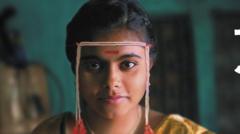In a society where arranged marriages dominate, "Sthal: A Match" brings to the forefront the often grim experiences of young women. This gritty Marathi film, released for the first time in Indian theaters, tells the story of Savita, a determined young woman seeking education and career fulfillment amidst patriarchal pressures in rural Maharashtra. Directed by Jayant Digambar Somalkar, the film portrays the brutal reality of match-making, highlighting not only the challenges Savita faces but also the emotional toll it takes on her family, particularly her father, Daulatrao.
The film opens with Savita interviewing a potential groom, where she and her relatives witness the subtle humiliations that accompany such encounters. Reviewers noted the objectification of women during these meetings, where Savita's worth is reduced to comments about her physical appearance. Savita’s aspirations for higher education and a career fall on deaf ears in a culture that prioritizes marriage above all else.
Throughout the film, Savita's frustrations resonate as she expresses her desire to finish college before contemplating marriage. However, societal norms dictate otherwise, perpetuating the belief that a daughter's worth is tied to her marital status. The film's portrayal of dowry practices underscores the emotional and financial burdens women and their families face.
"Sthal" is commendable not only for its storytelling but also for featuring an entirely first-time cast sourced from the village where it was filmed, making the narratives even more relatable. Somalkar's motivation for creating this film arose from his personal experiences, challenging traditional narratives and highlighting the urgent need for societal change regarding women's roles and rights in marriage.
By exploring these themes, "Sthal" seeks to spark conversation and provoke thought on an issue that continues to affect countless women in India. It serves as a reminder that change, while often slow, begins with awareness and dialogue.
The film opens with Savita interviewing a potential groom, where she and her relatives witness the subtle humiliations that accompany such encounters. Reviewers noted the objectification of women during these meetings, where Savita's worth is reduced to comments about her physical appearance. Savita’s aspirations for higher education and a career fall on deaf ears in a culture that prioritizes marriage above all else.
Throughout the film, Savita's frustrations resonate as she expresses her desire to finish college before contemplating marriage. However, societal norms dictate otherwise, perpetuating the belief that a daughter's worth is tied to her marital status. The film's portrayal of dowry practices underscores the emotional and financial burdens women and their families face.
"Sthal" is commendable not only for its storytelling but also for featuring an entirely first-time cast sourced from the village where it was filmed, making the narratives even more relatable. Somalkar's motivation for creating this film arose from his personal experiences, challenging traditional narratives and highlighting the urgent need for societal change regarding women's roles and rights in marriage.
By exploring these themes, "Sthal" seeks to spark conversation and provoke thought on an issue that continues to affect countless women in India. It serves as a reminder that change, while often slow, begins with awareness and dialogue.





















